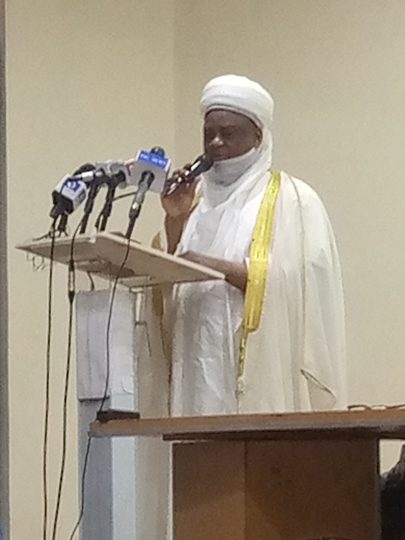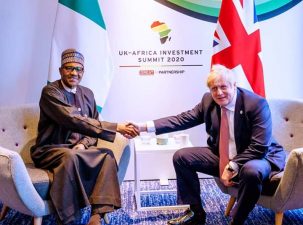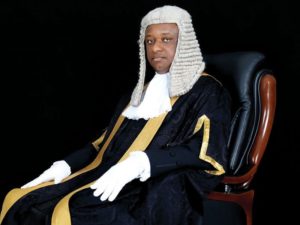By Kemi Kasumu
*Says Nigeria loses $1.5bn to desertification yearly
*Recommends solutions, as Sanwo-olu warns against impact of population explosion, open defication
The Sultan of Sokoto and President General of the Nigerian Supreme Council for Islamic Affairs (NSCIA), Alhaji Muhammad Sa’ad Abubakar, has put economic loss to desertification at $1.5 billion every year.

From Left: Deputy Governor of Lagos State, Dr. Kadri Obafemi Hamzat, Alake of Egba Land, Oba Aremu Gbadebo and the Elegunsi of Ikate Land, Oba Saeed Elegunsi, at the 18th S. L. Edu Memorial Lecture, held in Victoria Island, Lagos in Thursday January 16, 2020.
The Sultan, who was the guest lecturer during the 18th Chief S. L. Edu Memorial Lecture in Lagos Thursday, said the figure had been rising daily.
Speaking on the theme: “The Role of Leaders in Protecting and Restoring the Nigerian Environment,” the Sultan said that desertification has led to loss of resources in many areas in the North, adding that locations where desertification was more serious, its effects were higher.
“It affects food security, food availability and food affordability. I want you to note that food production is not food availability, but food affordability,” the monarch said.

From Right: Galadima Garin Sokoto, Alhaji Attahiru Aliyu, Sarkin Yaki Binji Sokoto, Alhaji Usman Kabiru,q Executive Chairman, Sokoto State Zakat and Endowment Commission, Mallam Lawal Maidoki and a university don, Engr. Ahmad Jumah, at the lecture.
He said it is the failure to manage the environment that leads to environmental degradation, adding that population growth has direct relationship with the amount of food produced in a given society.
The Sultan listed lack of food security as one of the factors necessitating migration for greener pastures and urged government to work on this and other population growth-related realities now dawning on the country.
Quoting front Qur’an and Hadeeth, the globally reckoned leader told the hall filled to capacity that it was important for Christians to know what Islam says about the environment and Muslims to know what Christianity says about the environment so that they can both have mutual understanding and develop harmonious attitude towards protection of their given environment.
While calling for collaboration of all stakeholders, the Sultan described 2016 and 2019 as the hottest years Nigeria ever recorded, adding that event had shown that the realities of climate change was here.
According to him, there was 600 metres desert encroachment per annum and that 60 percent of farmlands had been affected, saying that food security was being threatening daily.
He, however, cautioned political, traditional and religious leaders against politicising climate change crises in the country, advising that there was need to mobilise everybody to protect the environment.
He also called for paradigm shift, policy monitoring and clear political will by political leadership to mitigate climate change challenges and save the environment from further degradation.
He described the roles of traditional leaders in mitigating environmental issues as “enormous”, saying “they relate with the people, live among them, speak their language and enjoy their trust.”
In environmental sustainability, the monarch maintained that traditional rulers had a great role to play, noting that “the role of government is also very important because there can be no success without it”.
As part of the solutions, the Sultan recommended paradigm shift, monitoring and evaluation of environmental programmes and clear political will, saying this was important to meet the set target.
Explaining an important message from his paper by way of emphasis, he said: “I believe the last regime planned to bring in some stoves to check the effects of climate change by preventing women from cutting down trees for firewood. I believe billions of naira was set aside for it. I believe the people in the village who should access the money could not access it. So where is the money? Where are the stoves?” The Sultan querid.
The Sultan did not finish the lengthy but brilliantly briefed lecture until he had spoken about the aspect where climate change is cause of clashes between herders and farmers.
Urging those misrepresenting the situation to “relax the atmosphere”, the Sultan used to recalled how the routes for cows are no longer there due to population explosion, which many believe caused problems because successive governments did not plan for.
Cows at some points, therefore, stop and, unfortunately and regrettably, they destroy farmlands, adding that while farmers need their crops, the herders need their cows to feed to survive.
“So, this is the problem. It is basically economic problem that has nothing to do with religion, ethnicity. It is the politicians that making it look like what it has become,” the Sultan rounded up his lecture amidst loud ovation.

The Sultan being presented a plaque of honour in appreciation of his attendance as guest lecture, by a former Nigerian Minister President of Nigerian Conservation Foundation (NCF), Chief Phillip Asiodu, at the 18th S. L. Edu Memorial Lecture held in Victoria Island Lagos, on Thursday January 16, 2020.
In his goodwill message, Governor of Lagos State, Mr. Babajide Sanwo-olu warned against worse scenario as he raised alarm over the negative impact of increasing number of Nigerian population as well as effect of other man-made activities such as open defecation on the environment.
Sanwo-Olu, who registered this concern at the event, said the bigger challenge for Nigeria and the whole of Africa, was how to manage the growing population.
According to him, African population is jumping massively and by 2050, it was estimated that African population would become about 4 billion while population of other continents like Europe, Asia and America are declining.
Represented by Deputy Governor of the state, Dr. Kadri Obafemi Hamzat, Sanwo-Olu stated that the landmass of Nigeria is about 923,707sqkm, but the livable part of that landmass is reducing due to erosion, flood, disaster encroachment and others.
“In the 70s, Lake Chad was predominantly bordered by four countries including Nigeria, Cameroun, Niger and Chad. The surface of the water was 26,000sqkms while the depth was about 11 meters severing close to 40 million people. Today, the same water is 1,350sqkms which is a reduction of about 14,000 percentages. The tragedy was that the population in that locality had now increased,” he stated while citing example of the role of population explosion on environmental degradation.
Emphasising on the need for Nigeria and the whole of Africa to begin to find solution to the explosive population, he noted that if left unaddressed, the situation would get to the point that it would become difficult for Africans to sustain themselves.

“Our living standards are crashing and people are dying over environmental catastrophes. The resources are shrinking so rapidly. We must identify our focus to know if it is about having people or development just like in the other parts of the world,” he said.
He however raised alarm over the increasing number of open defecation and poor sanitation in Lagos state, stating that there must be a paradigm shift, if we must leave a sustainable life. “Open defecation is now massive in Lagos and it is not acceptable because it is recipe for disaster.”
“What is important is advocacy for people to begin to understand what the challenges are. We are having environmental courses even in our primary schools to let the children know what is right to do in order to save the environment. We talked about recycling to convert the plastics into something else because it is not biodegradable,” he added.




